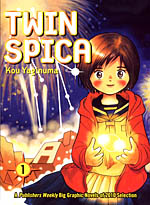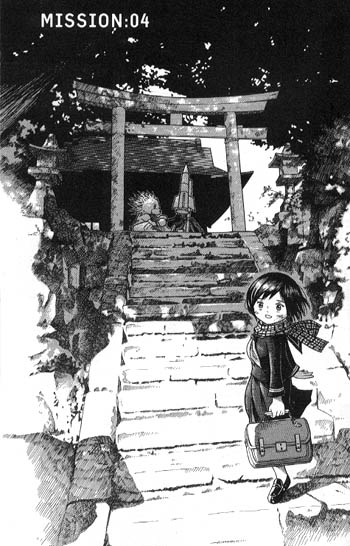 By Kou Yaginuma
By Kou Yaginuma
192 pages, black and white
Published by Vertical, Inc.
I almost didn’t buy Twin Spica because of the cover. There was something about it, with its creepy little girl holding two glowing objects, while strange lights fell from the sky, that was an instant turn-off. Was it because it felt like a science-fiction version of Children of the Corn? Or a strange reversed-gender riff on Akira? Fortunately, I have friends who are less afraid of strange cover design, and their repeated ravings over Twin Spica made me finally reverse my stance and pick up the first volume. I’m here to tell you that they were right, and I was wrong. If anything, I’m kicking myself for staying away as long as I did.
Twin Spica is in many ways a love song to the idea of space exploration. Named after the binary Spica star system in the constellation of Virgo, it focuses on young applicants to Japan’s space program, and the yearning each of them have towards traveling towards the stars. Asumi is the main character of the book, and Kou Yaginuma includes in her background a space-related tragedy that killed part of her family. At first, it’s easy to think that it exists solely to dredge up some drama for her character. It’s part of why her father initially objects to her going to the academy, and her memories of her mother’s death crop up at inopportune moments. The more you read of Twin Spica, though, the more it begins to look like Yaginuma is using Asumi’s mother’s death to talk about the need among the characters to make it out into space. After all, it was attempts at space travel that killed Asumi’s mother, but even then Asumi cannot shake her devotion toward her life’s dream. It ends up coming across as a powerful urge, and helps solidify the book.
 Twin Spica Volume 1 includes several prequel stories that were created before the Twin Spica series began, but which form the basis for the book. They’re odd entries in their own right, glimpses into a dreamland underworld where children get the chance to see their deceased parents before they cross over into the realm of the dead forever. We also see more of the spectral figure that Asumi calls Mr. Lion, a character that in the main Twin Spica chapters appears to be little more than a mental crutch that Asumi uses to help deal with her mother’s death. In these prequels, though, we start to see more about Mr. Lion’s true nature; it’s a mystical-in-nature story (like the other prequel) that is enchanting, but it doesn’t feel like it quite connects with the rest of Twin Spica in terms of content. It’s hard to ignore some of cultural differences along the way in Twin Spica. Most notably, there are several images of a parent slapping a child in this first book, and while it’s clearly not meant to look as being abusive it will probably startle Western audiences where physical punishment of children has become taboo. It’s a clear reminder that Twin Spica isn’t just a comic that happens to be translated from Japanese, but rather a real Japanese comic with all of its own cultural benchmarks and foibles.
Twin Spica Volume 1 includes several prequel stories that were created before the Twin Spica series began, but which form the basis for the book. They’re odd entries in their own right, glimpses into a dreamland underworld where children get the chance to see their deceased parents before they cross over into the realm of the dead forever. We also see more of the spectral figure that Asumi calls Mr. Lion, a character that in the main Twin Spica chapters appears to be little more than a mental crutch that Asumi uses to help deal with her mother’s death. In these prequels, though, we start to see more about Mr. Lion’s true nature; it’s a mystical-in-nature story (like the other prequel) that is enchanting, but it doesn’t feel like it quite connects with the rest of Twin Spica in terms of content. It’s hard to ignore some of cultural differences along the way in Twin Spica. Most notably, there are several images of a parent slapping a child in this first book, and while it’s clearly not meant to look as being abusive it will probably startle Western audiences where physical punishment of children has become taboo. It’s a clear reminder that Twin Spica isn’t just a comic that happens to be translated from Japanese, but rather a real Japanese comic with all of its own cultural benchmarks and foibles.
Yaginuma’s art is sweet and delicate, all of the characters (even the swaggering cool guy who alternates between jerk and insightful) coming across with soft features and a minimalist approach. This both does and doesn’t work to Yaginuma’s advantage; I think that it makes some of the characters much more sympathetic and likable, but it’s also hard to look at the tiny and childlike Asumi and remember that she’s supposed to be thirteen years old. While there are a lot of pages without backgrounds in the panels, Yaginuma crystallizes the most important moments for the reader; from a child up a temple’s stairs, to the exhausted recruits finishing their first test in the nick of time.
Twin Spica has one final element that pulls everything together, and that’s charm. It’s hard to remain cynical about anything while reading Twin Spica; even in the face of tragedy or failure, it keeps drawing the reader in with the promise of something good for its characters (and the reader) just around the corner. And, inevitably, it delivers. Twin Spica helps restore wide-eyed wonder about space travel to even the most jaded audience, without ever failing to take its material seriously. This is a charming book that you’ll want to read and re-read over and over.
Purchase Links: Amazon.com | Powell’s Books
